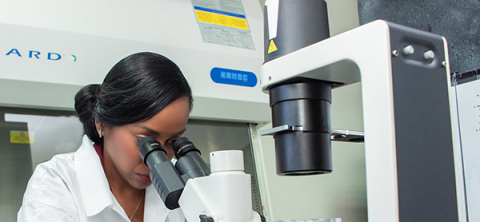
The UWI's Dr Simone Badal determined to make a long-lasting impact
IT CAN NEVER be underestimated the impact a good teacher can have on many a student no matter the age. For Dr Simone Badal, a young pioneer in cancer research, one professor at The UWI piqued her interest in making medical research her life's mission.
Part of her groundbreaking medical research has been discovering that not enough has been done over the years to take an in-depth look at the effects of natural Jamaican ingredients to prevent and treat cancer among Afro-Caribbean populations.
"I believe it was the beginning of final year in my undergraduate degree. I was in a lecture and a professor, who taught biochemistry, walked in. He gave his lecture with only a chalk in one hand and no material to consult, after which he provided a bit of background on what his research at The UWI entailed. The way he [Dalip Ragoobirsingh] delivered the lecture was just inspiring. So I approached him and asked if I could be his research student. I believe that was the genesis of my interest in research specifically focusing on biochemistry," Badal recalled.
Today, her vision as head of the Anti-Cancer Research Jamaica (ACRJ) Culture Lab is to be part of developing a first-world anti-cancer research centre at The UWI, Mona.
"I am a cancer researcher, and while I am still relatively young in my research career I have been frustrated because there is so much work to be done on natural products. Yet our resources and environment really limit us to fully exploring the bioactivities of these natural products," she said.
Badal believes that if we can't take the science all the way to clinical benefits" then we will never be able to fully take advantage of the efficacy of these products.
"Our lab allows us to work at developing cancer cell lines from a Jamaican populace so that we can utilise these tools to understand cancers among our people who are primarily of African descent," she continued.
"This is important because there is a severe disparity in the tools (cancer cell lines) made available to us when it comes to understanding cancers, hence persons of African descent don't get the same kind of efficacy or treatment or see the same results from current chemotherapy drugs as other ethnic groups," she explained.
"For my PhD research, we screened several Jamaican natural products and looked to see firstly if they could prevent, block or reverse the process of cancer termed chemoprevention and secondly if they could kill cancer cells, and what effect these products would also have on normal cells."
"The chemopreventive aspect was achieved by us looking at the ability of our natural products to inhibit the activities of select enzymes in the body that are known to convert pro-carcinogenic compounds into reactive derivatives or carcinogenic derivatives known to participate in initiating cancer. If we can block their activities we can prevent the activation of these compounds," she told UWIMONA Now. "What we found was that several of our products inhibited the activities of these enzymes and so they could potentially prevent cancer, but more work is needed on the compounds to fully realise their benefits," she said.
Additionally, her research, she said, unearthed that "several of the compounds reduced the viability or killed the cancer cells more potently than current chemotherapy drugs. Furthermore, several of our compounds did not harm normal cells relative to known chemotherapy drugs, and those findings have been published in noteworthy international medical journals."
However, after she completed her PhD research she said: "I realised the cell lines I looked at, to deem these products anti-cancerous were Caucasian in origin."
Determined to make a long-lasting impact on cancer research Badal explained: "At that moment it was clear that I not only wanted to research these compounds towards anti-cancer efficacy, but wanted to ensure they were able to treat cancers within the Jamaican or Caribbean populace first."
"So I said why don't we test them on our cell lines first? When I looked, there were no cell lines from the Caribbean; cell lines available to us as researchers around the world are primarily Caucasian and it became even clearer to me why we have these disparities" she remarked.
Despite her frustrations, Badal has made significant strides. It therefore came as no surprise that in 2014 she was bestowed the Elsevier Foundation Award as a leading female chemist among five women from the developing world where she represented the Caribbean and Latin American regions. The UWI also paid tribute to her as one of 70 outstanding women through its history across the three campuses who have rendered world-class service.
Meanwhile, noting that there is much more work to be done, Badal singled out prostate cancer in men and breast cancer in women as the two most dangerous cancers affecting Jamaicans.
"Caribbean men are more susceptible to developing prostate cancer and are two and a half times more likely to die from the disease than white men. We also learnt that these current drugs are not as effective in treating advanced prostate cancer among men of African descent as they are effective in treating the same type of cancer in Caucasian men," she noted.

